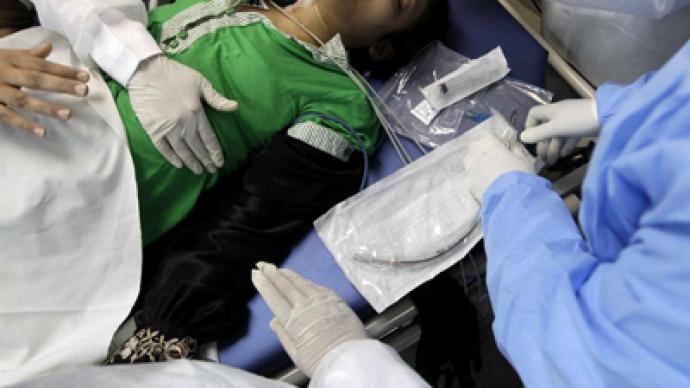A Bahraini court has sentenced the daughter of a prominent opposition activist to one month in jail for her alleged involvement in an unauthorized rally. Despite the brutal police crackdowns on protesters, Bahrainis are still eager to defend their rights.
The defense team of Zainab al-Khawaja, the eldest of the Shiite rights activist's daughters, now argues that Pearl Square, the cradle of 2011 protests, was not officially declared “a forbidden area."The prosecution demanded Khawaja's detention for a week on charges of launching a provocation against the regime. Only this year alone she has face several charges on different occasions. It is now two months since she was released from jail after serving two months for destroying what was considered government property. Khawaja had been convicted of tearing down a portrait of King Hamad during detention.A few months prior to that case, in May, she was jailed for one month for what the prosecution called assaulting a police officer.At the same time, her father is serving a life sentence for plotting against the state. This story is just one of many in Bahrain. Dozens of people have been killed in the demonstrations, mostly as a result of the heavy-handed crackdown by the Bahraini government.But despite the life-threatening situation, protesters say they will continue with their demands for the establishment of a democratically elected government.Sadiq Rabia told RT his life was shattered. Several months ago he was shot by police during a peaceful protest. Looking at the scars his injuries left behind, he is lucky to be alive.“I was with many other protesters when we were faced by riot police. They did not hesitate to shoot us directly in the head,” he says, adding that he was hit with “over 192 bullets” to his body, head and face. Sadiq is just one of hundreds who have suffered in the anti-government protests that started around 20 months ago, when revolution fever was sweeping the Middle East and North Africa. The dissent in Bahrain differs little from that in nations swept up by the Arab Spring.“Protesters never stop. They are every day in different areas against the regime, against the dictatorship, against the situation. There are around 1,500 political prisoners,” Radhi Al Mosawi, member of opposition party Waad told RT. “Every day we have a lot of security forces surrounding the area, attacking people, attacking houses.”It is nearly impossible to determine how many people are actually taking part in Bahrain's protest movement. “In one year we had 400 protests – more than a protest per day. We have tried to solve the problem, but we weren’t able to control the crowd,” Tariq Al Hassain, chief of public security of Bahrain, told RT. Over the year of mass protests, Bahraini authorities stripped citizenship from dozens of opposition figures, sentenced medics to prison terms for treating injured activists, brutally dispersed protest gatherings and arrested people for as little as showing disagreement with the ruling regime. It also sentenced Nabeel Rajab, a prominent human rights activist and popular Bahraini blogger to three years in prison for calling for unauthorized marches through social networking sites, and for participating in them.

